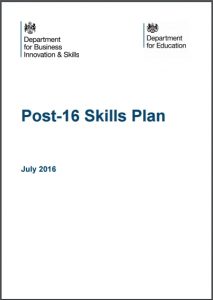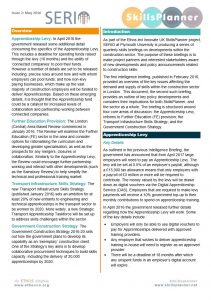To help keep SkillsPlanner stakeholders updated on key developments relating to construction skills in both industry and government, Plymouth University’s SERIO applied research unit is producing a series of intelligence briefings. The first was published in February (post); the second (PDF) has just been finalised and is now available in our media section.
Written in clear, non-academic English, these briefings are and intended to inform and engage our audiences with the ongoing R&D project. The latest looks at four main topics (some also discussed on the SkillsPlanner blog):
- Apprenticeship Levy: In April 2016 the government released some additional detail concerning the specifics of the Apprenticeship Levy. This includes a deadline for spending funds raised through the levy (18 months) and the ability of ‘connected companies’ to pool their funds. However a number of details are yet to be released including: precise rules around how and with whom employers can pool funds; and how non-levy paying businesses, which make up the vast majority of construction employers will be funded to deliver Apprenticeships. Based on these emerging details, it is thought that the Apprenticeship fund could be a catalyst for increased levels of collaboration and partnership working between connected companies.
 Further Education Provision: The London (Central) Area Based Review commenced in January 2016. The Review will examine the Further Education (FE) sector in the area and consider options for rationalising the curriculum and developing greater specialisation, as well as the prospects for any mergers, closures or collaboration. Similarly to the Apprenticeship Levy, the Review could encourage further partnership working and interact with other developments (such as the Sainsbury Review – post) to help simplify the technical and professional training market.
Further Education Provision: The London (Central) Area Based Review commenced in January 2016. The Review will examine the Further Education (FE) sector in the area and consider options for rationalising the curriculum and developing greater specialisation, as well as the prospects for any mergers, closures or collaboration. Similarly to the Apprenticeship Levy, the Review could encourage further partnership working and interact with other developments (such as the Sainsbury Review – post) to help simplify the technical and professional training market.- Transport Infrastructure Skills Strategy: The new Transport Infrastructure Skills Strategy (published January 2016) sets an ambition for at least 20% of new entrants to engineering and technical apprenticeships in the transport sector to be women by 2020. More widely, a new Strategic Transport Apprenticeship Taskforce will be set up to address skills challenges within the sector.
- Government Construction Strategy: The Government Construction Strategy 2016-20 (see also this post) sets out how the government plans to develop its capability as an ‘exemplary’ construction client. One of the Strategy’s key aims is to develop collaborative procurement techniques to build skills capacity, including the delivery of 20,000 apprenticeships by 2020.



